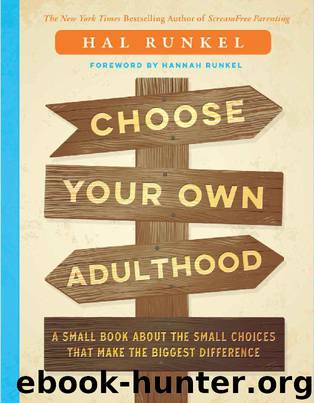Choose Your Own Adulthood: A Small Book about the Small Choices that Make the Biggest Difference by Hal Runkel

Author:Hal Runkel [Runkel, Hal]
Language: eng
Format: epub
ISBN: 9781626343849
Publisher: Greenleaf Book Group Press
Published: 2017-03-28T06:00:00+00:00
* * *
Now, if you’d like to pursue a life with no regrets, keep reading on the next chapter.
If, instead, you wanna look at the difference between love and loyalty, go back to chapter 4 on page 37.
CHAPTER NINE
“Why not go out on a limb?
That’s where the fruit is.”
—WILL ROGERS
Normally, when it comes to young people, the word "risk" is only used in a negative way. As in, “We don’t want our teenagers engaged in risky behavior,” or “Our community has far too many at-risk youth.”
The reason we try to steer teenagers and young adults like yourself away from risk is because we are so afraid you’ll do something you later regret. Like having premature, pregnancy-inducing, gonorrhea-inviting sex. Or engaging in reckless, careless driving that leaves at least one person forever eating through a straw.
These were certainly the risky behaviors my generation was warned about. With you guys today, however, we’ve added a bunch to the list—like posting a frat-party pic that now comes up every time a potential employer Googles your name or, God forbid, posting a pic of your dad that makes him look exactly as fat as he is in real life. (Sadly, the camera is not what adds 10 pounds. It's the Krispy Kremes, remember?)
Are all these behaviors risky? Of course. So are trying drugs, drinking to excess, playing around with guns, and jumping off your chimney into your pool (guilty as charged). Would you regret any and all of the consequences of these actions? Again, yes, of course. But the truth is, despite all of your parents’ warnings, not all risk is to be avoided.
What all of these cautions seem to miss is that risk is not just a negative term. Even big insurance companies who stand to lose millions when their clients make big mistakes don’t talk about risk avoidance—they talk about risk management. Risk is not something to be avoided at all costs; it is something to be managed. It is something to be carefully calculated, chosen, and executed.
What’s better to be avoided is regret. Regret is an awful feeling. It’s a nasty way of looking backward that makes you want to curse your former self and shame your current one.
The truth is that most of our regrets in life aren’t about the risks we did take; most of our regrets come from the risks we didn’t. There was a study done, not too long ago, of older people as they approached their deathbeds. These great old folks were asked a series of questions about their lives, their choices, their legacies, etc. When asked about the things they regretted the most, their answers were almost universally the same. Almost all of them, upon reflection, said the things they regretted the most were not the things they did; what they regretted the most were all the things they were too afraid to do.
The girl he didn’t ask out.
The degree she never finished.
The investments they backed out of.
The dream career she never chased.
The things he never said to the people who mattered most.
Download
This site does not store any files on its server. We only index and link to content provided by other sites. Please contact the content providers to delete copyright contents if any and email us, we'll remove relevant links or contents immediately.
The Compound Effect by Darren Hardy(8904)
Wonder by R.J. Palacio(8553)
Atomic Habits: Tiny Changes, Remarkable Results by James Clear(8305)
Becoming Supernatural by Dr. Joe Dispenza(8186)
Wonder by R. J. Palacio(8085)
Change Your Questions, Change Your Life by Marilee Adams(7718)
The Road Less Traveled by M. Scott Peck(7574)
Born to Run: by Christopher McDougall(7105)
Daring Greatly by Brene Brown(6487)
Big Magic: Creative Living Beyond Fear by Elizabeth Gilbert(5726)
Grit by Angela Duckworth(5577)
The Slight Edge by Jeff Olson(5398)
Men In Love by Nancy Friday(5218)
The Wisdom of Sundays by Oprah Winfrey(5135)
You Are a Badass at Making Money by Jen Sincero(4905)
Fear by Osho(4721)
The Miracle Morning by Hal Elrod(4692)
The Four Tendencies by Gretchen Rubin(4587)
Rising Strong by Brene Brown(4431)
